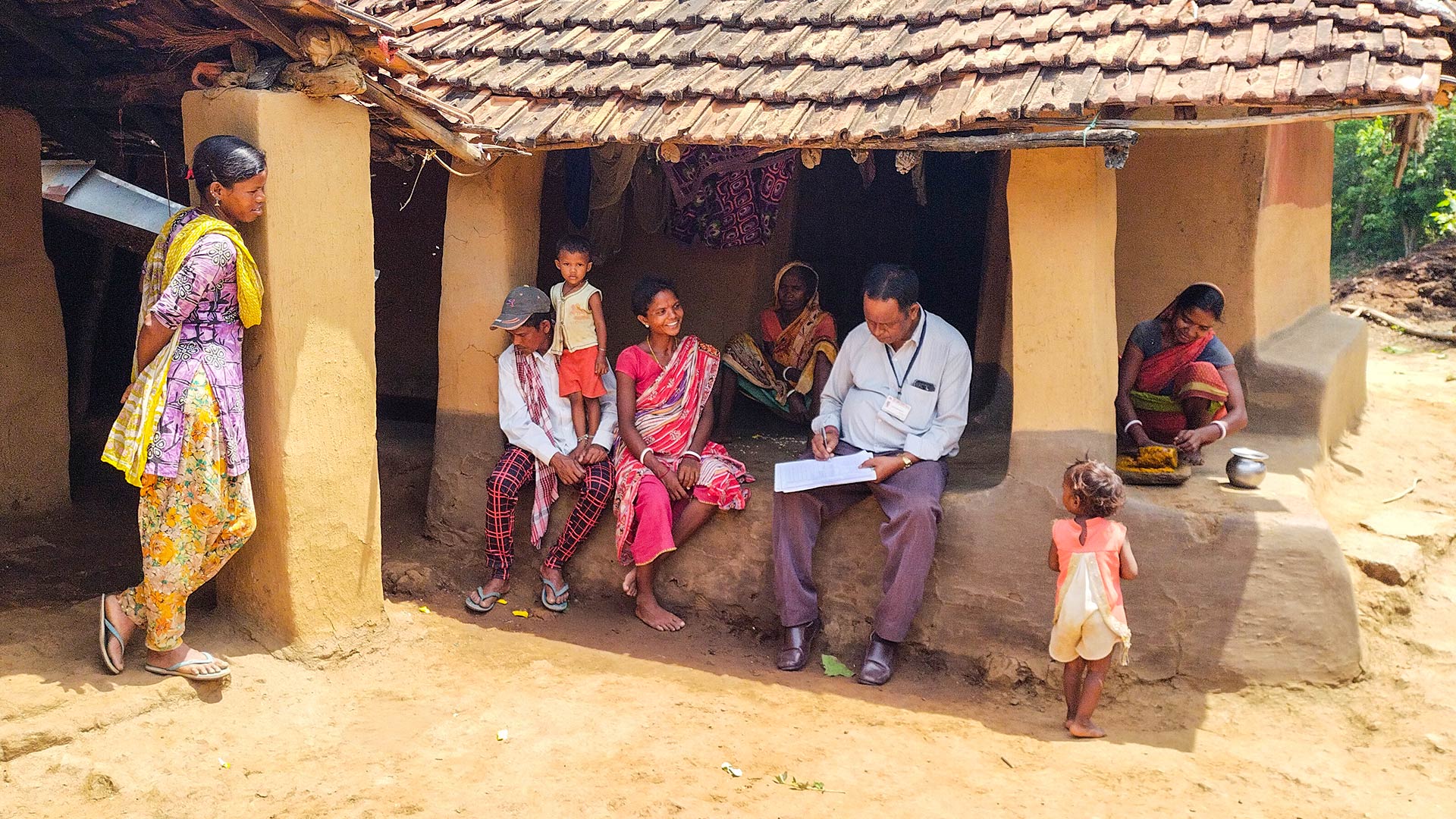May 2024 | 1810 words | 7-minute read
A steadfast commitment to serving the communities in which it operates has always been a touchstone for Tata Motors. The company’s CSR journey began at its inception in 1945, with its first manufacturing unit in Jamshedpur. Subsequent units in Pune, Lucknow, Pantnagar, Sanand, and Dharwad followed suit, designing their CSR programmes to address the developmental needs of their proximate communities.
In 2014, the company adopted a One-Tata Motors CSR Strategy to harmonise programmes across locations in the areas of health, education, employability, and the environment. Over the years, individual CSR units developed capabilities and expertise that could be replicated across locations. “For example, Jamshedpur had made great strides in the area of malnutrition,” shares Vinod Kulkarni, Head, CSR, Tata Motors. “We wanted to have uniform deployment across locations, leaving scope for local alliances that took into account nuances of local needs.”
This also led to the adoption of a Human Life Cycle Approach to make an impact on the entire lifespan, progressing from healthcare and nutrition in infancy, education for the young, employability and sustainable livelihoods for the youth to addressing the health needs of the elderly. The company’s More From Less For More philosophy replaced the reliance on funds allocated from the plant revenue budget. It involves striving to achieve greater impacts and outcomes through judicious investment and utilisation of financial and human resources, and engaging in like-minded stakeholder partnerships.
A decade of making an impact
- 60 lakh+ lives touched
- 40% belong to Scheduled Castes and Scheduled Tribes
- Rs 200 crore spent on CSR efforts
- 26 states and 8 union territories reached
- 20 lakh trees planted
Tata Motors is achieving this by engaging with all stakeholders, including private, NGO and government partners, to expand scale and impact. “We leverage the strengths of all project stakeholders, bringing in new ways of doing the same thing, more effectively and with greater reach, but using less resources,” says Mr Kulkarni. The new philosophy, convergence with partners, and adoption of digital technologies in 2017 to replicate and scale efforts, helped achieve nationwide impact by 2019. The initiatives continue to transform lives — from 2 lakh in 2014 to 8 lakh in 2023 — with the majority from marginalised communities.
Here’s a look at select marque projects under the four focus areas.
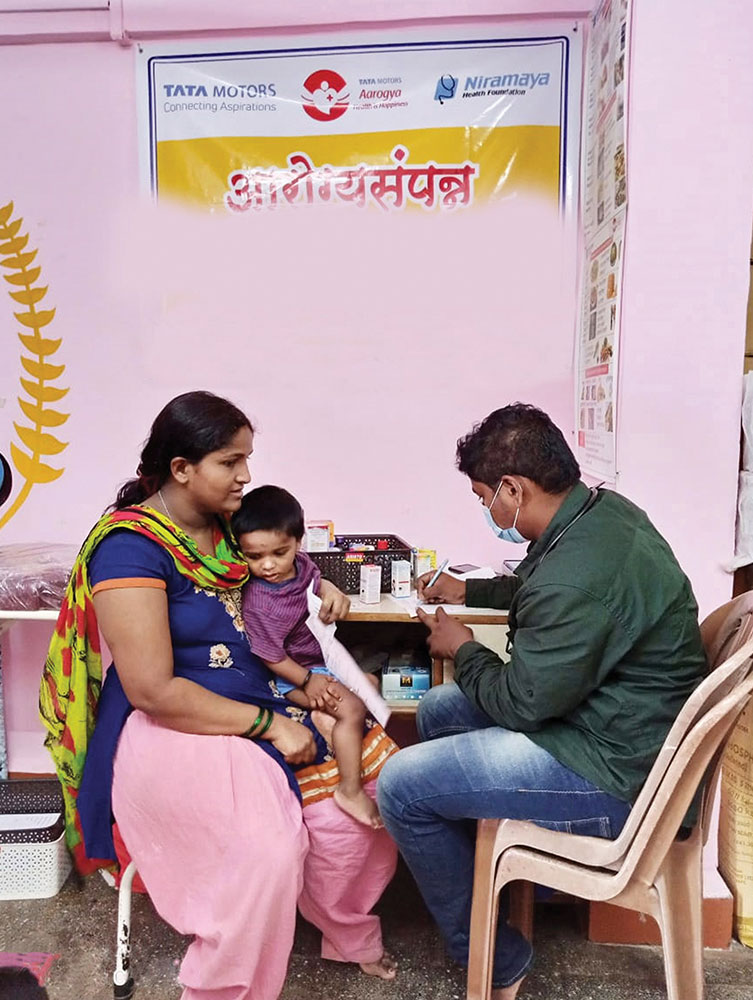
Aarogya | Health
Addressing malnutrition through treatment and financial empowerment
Sabapati, the two-year-old child of farmers in the Birra tribal district in Jharkhand, was diagnosed with Severe Acute Malnutrition (SAM) and admitted to the Malnutrition Treatment Centre (MTC) set up in 2009 by the Jamshedpur plant, in collaboration with UNICEF and the National Rural Health Mission — the first of its kind by a corporate. Sabapati, who was found to be critically underweight at 6.9kg, is one of 2,000+ SAM children to receive care at the MTC since its inception. Care included a diet chart with therapeutic feed and formula, regular supplements, nutritious food and continuous monitoring for the child, and for his mother, sessions on techniques to cook nutritious food, personal hygiene and family planning, as well as compensation to cover wage loss during treatment.
As a result, Sabapati’s weight began to rise, reaching 8.7kg.
Meanwhile in 2014, a community-based approach was adopted in Pune. Sameena Sheikh is one of many community link workers building resilience in vulnerable communities. Ms Shaikh identified widows with malnourished children, analysed their ability to build micro-enterprises, and acquired monetary support for 30 women — Rs 10,000 each — from a government scheme to start businesses. These outreach programmes, along with inpatient care and mass awareness drives, ensured that 80% of malnourished children became healthy on a sustained basis.
Fighting leprosy with early detection and awareness
When it comes to tackling leprosy, early awareness and treatment are key. Through its support of Nav Jagrat Manav Samaj (NJMS) in Jamshedpur, Tata Motors has aided in leprosy prevention and control. NJMS conducts an annual door-to-door survey to detect new, unreported cases, reaching 75,000+ people. Since 2018, it has helped reduce the incidence of leprosy from 1.5 persons per 1,000 to 0.5 persons per 1,000. Antyoday Bhawan offers elderly leprosy patients free medical treatment, along with boarding and lodging, and has reached over 60% of residents through awareness initiatives.
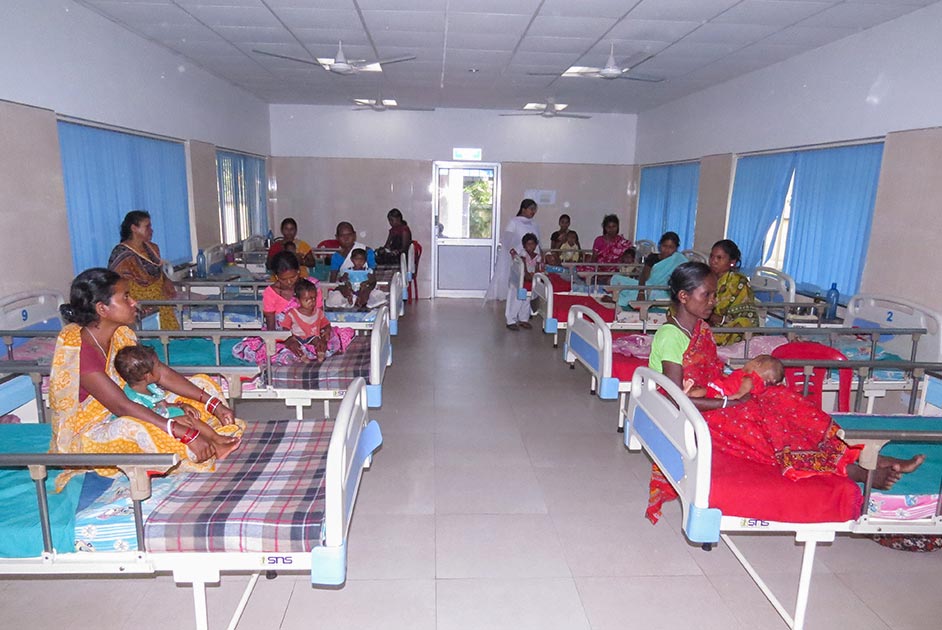
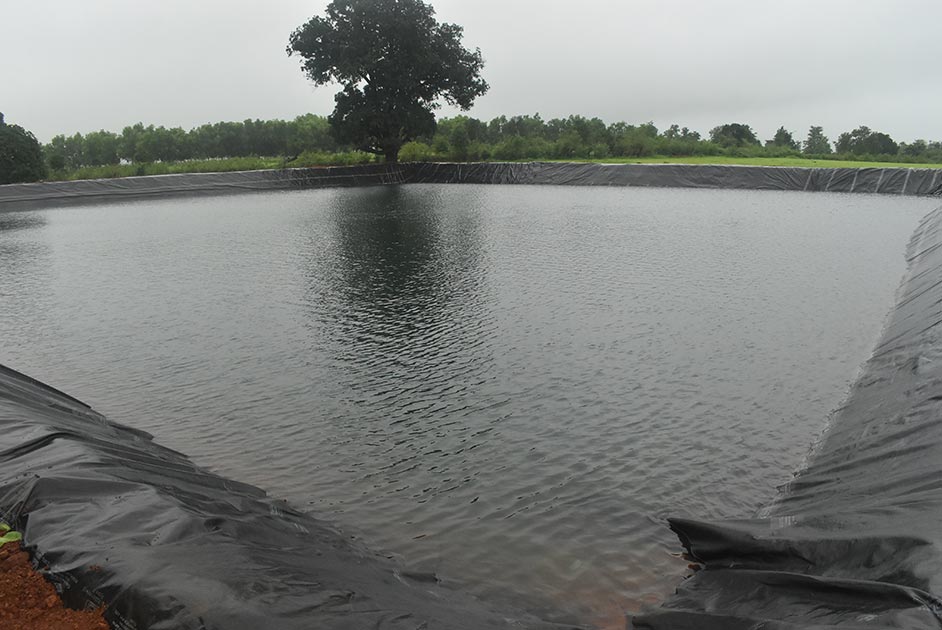
Ensuring safe drinking water
In 2006, the Sumant Moolgaokar Development Foundation launched Amrutdhara, a programme that offers a low-cost, community-managed safe drinking water solution for chronically water-stressed habitations across India. Its goal is to provide enhanced quantities of safe drinking water and reduce the distance travelled to fetch water. Over the past decade, 800 water projects have been completed, impacting 3.5 lakh+ people across 550+ villages. It has created a dense network of infiltration wells, community farm ponds and hand pumps.
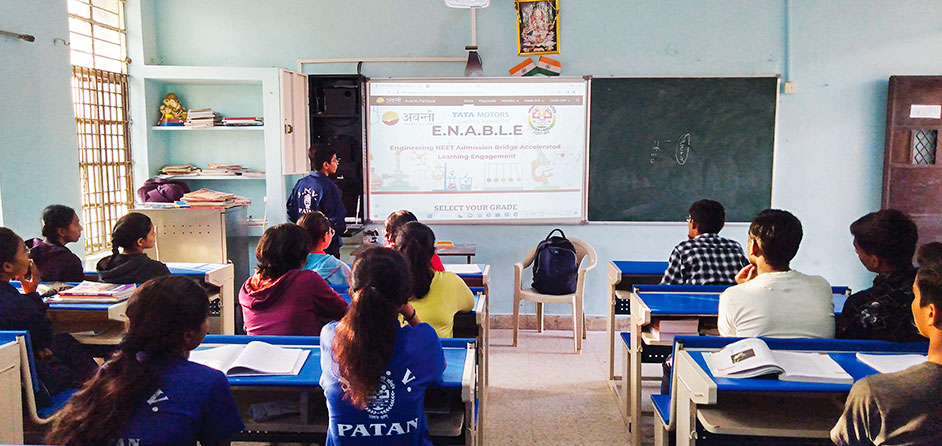
Vidyadhanam | Education
ENABLE-ing success in entrance exams
Sabir Alam has come a long way — from struggling for funds to support his education, to playing a role in the successful landing of Chandrayaan-3 as a scientist at the Indian Space Research Organisation (ISRO). He is one of thousands of beneficiaries of ENABLE (Engineering and NEET Admission Bridge Accelerated Learning Engagement), an initiative by Tata Motors and Navodaya Vidyalaya Samiti, the governing committee of all Jawahar Navodaya Vidyalayas (JNVs), which offers free education to promising students from rural India.
ENABLE’s remote learning programme offers JNV students coaching for leading professional entrance exams. Mr Alam credits ENABLE with helping him gain admission to IIT Madras, from where he earned a BTech in Aerospace Engineering. His success story illustrates ENABLE’s aim — to empower students to lift themselves and their families out of poverty in a single generation by helping them qualify for elite courses.
In 2023, 63% of students who underwent JEE/NEET coaching cleared JEE Advanced, of which 70% got into IITs, while 78% qualified for NEET.
Empowerment through coaching
Ruturaj Nalawade was among 10,000 students from economically deprived families in 141 Maharashtra state schools to benefit from Tata Motors’ Special Coaching Classes in 2013-14. He was in Std 10 when the company initiated this programme in 2013, and appointed 100+ teachers to conduct coaching classes to help stem dropouts. Mr Nalawade secured 76% in his final exams and is now an assistant civil engineer with a construction company, earning a monthly salary of Rs 42,000. By introducing digital classrooms and learning models, as well as Topscorer, an e-learning application with curriculum-based visual and audio content, Tata Motors has helped students move from an <60% pass percentage (2013) to >95% (2023).
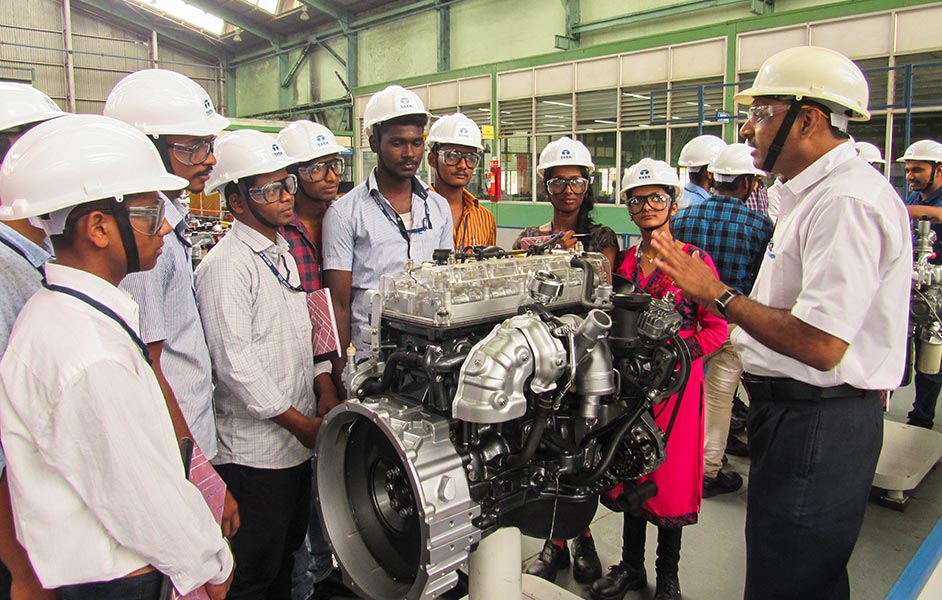
Kaushalya | Employability
Skilling unemployed youth for a brighter future
Bella Sara, a science graduate from Kochi, was passionate about pursuing a career in the automotive sector. Aware that it was a male-dominated vertical and that course fees would be draining for her daily wage-earning family, Ms Sara enrolled in the Automotive Service Technician course conducted by the Learn, Earn and Progress (LEAP) programme as it offered her financial support, like a stipend for expenses and a fee concession. The 12-month course included training at a Tata Motors dealership and she now has a job, working for a construction equipment dealer.
Thousands of economically disadvantaged youth, like Ms Sara, have been empowered by LEAP. While Tata Motors is the knowledge partner, industrial training institutes (ITIs) conduct the theoretical training, and Tata Authorised Service Stations and car dealerships provide on-the-job training. LEAP has had an 85% placement rate since 2014 and women comprise 13% of the trainees.
Tata Motors has also partnered with Navodaya Vidyalaya Samiti to offer an automotive skilling programme for Std 9 and 12 students from JNVs, setting up 25 skill labs in these schools.
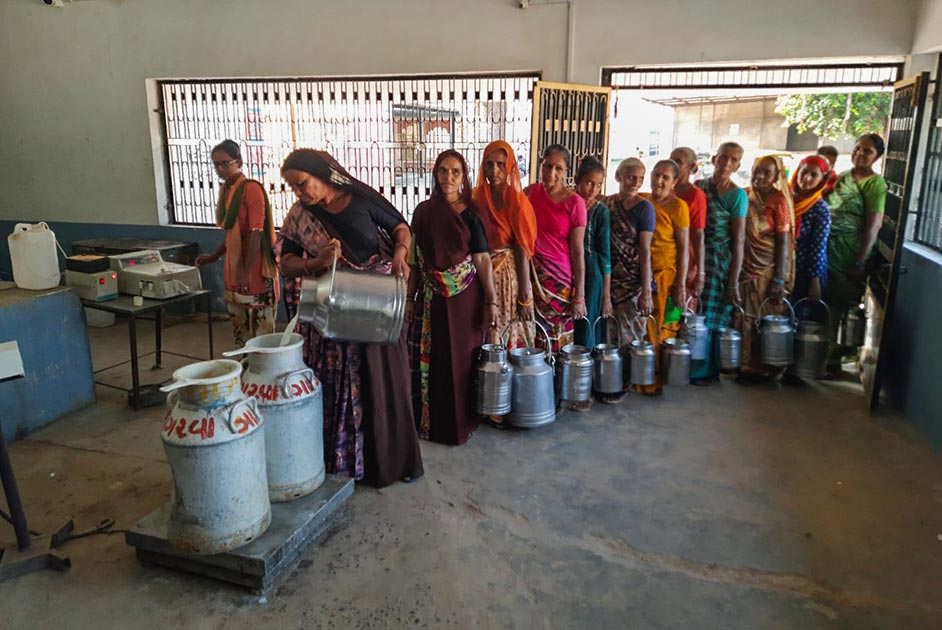
Powering Sanand’s white revolution
In 2010, Tata Motors partnered with Ahmedabad District Co-operative Milk Producers Union and Gujarat Dairy Development Board to link milk producers of the area to them, so as to introduce the benefits of cooperatives and modern methods to increase dairy output and income. Part of the company’s efforts to promote employability in agriculture and allied areas, the programme benefits 4,496 members from 32 villages through Automated Milk Collection Systems and Bulk Hybrid Chilling Units. This has led to a 33% rise in milk production and a 58% growth in average income.
Weaving threads of change
In Lucknow, the Tata Motors-promoted Samaj Vikas Kendra (SVK) motivated women to leverage their skills in Chikankari to earn livelihoods and become self-reliant, using the self-help group (SHG) model. The scope was increased in 2011 to help members gain additional skills and incomes. From three SHGs and 45 women earning Rs 600 per month in 2014-15, the programme has enabled 32 SHGs, with 384 women earning Rs 5,000 per month.
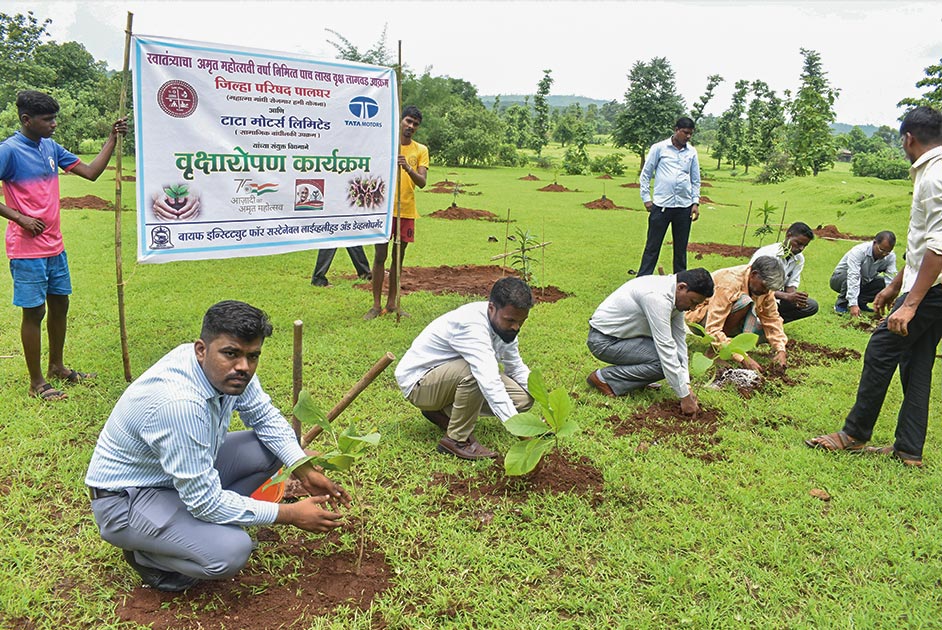
Vasundhara | Environment
Nurturing urban forests
In 2014, Tata Motors undertook the task to regreen Pune by piloting the concept of urban forestry. In collaboration with the Forest Department of Maharashtra, the company worked with TERRE Policy Centre to reforest an encroached area of 16.5 hectares in Warje, Pune, that had become a dumping ground for waste and was vulnerable to illicit mining. From 2015 to 2017, TERRE, Tata Motors volunteers and citizens planted 9,500 mature indigenous trees with a high survival rate, that required minimal aftercare and low input cost, resulting in 5,62,000kg of oxygen being produced every year. This has led to an improvement in air and soil quality and increased biodiversity. In 2017, the project was scaled to cover six urban forests, a cumulative area of 200 hectares that hosts 1.25 lakh trees.
New projects
Tata Motors has also launched two new marque projects in 2022-23 — Amrit Sarovar (to rejuvenate 100 water bodies) and One Million Plantation (to plant a million saplings to improve the quality and quantity of farm produce and provide farmers with sustainable livelihoods). Both are being carried out in convergence with government schemes and Mr Kulkarni says they have been piloted by a corporate for the very first time. He adds, “We have a reach beyond our plant locations and we will continue to grow that. We will focus on a statewide presence in national programmes across the country, and on integrated village development programmes, wherein we will have a holistic approach. We will be a preferred partner of the government for leveraging or helping them deploy their programmes more effectively. We also want to focus on people with disabilities and empowering transgender people.”
—Anuradha Anupkumar




